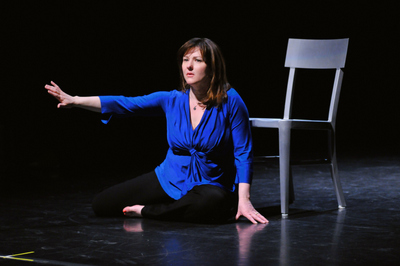- About MAA
- Membership
- MAA Publications
- Periodicals
- Blogs
- MAA Book Series
- MAA Press (an imprint of the AMS)
- MAA Notes
- MAA Reviews
- Mathematical Communication
- Information for Libraries
- Author Resources
- Advertise with MAA
- Meetings
- Competitions
- Programs
- Communities
- MAA Sections
- SIGMAA
- MAA Connect
- Students
- MAA Awards
- Awards Booklets
- Writing Awards
- Teaching Awards
- Service Awards
- Research Awards
- Lecture Awards
- Putnam Competition Individual and Team Winners
- D. E. Shaw Group AMC 8 Awards & Certificates
- Maryam Mirzakhani AMC 10 A Awards & Certificates
- Two Sigma AMC 10 B Awards & Certificates
- Jane Street AMC 12 A Awards & Certificates
- Akamai AMC 12 B Awards & Certificates
- High School Teachers
- News
You are here
A Logic Major Hits Reality at MIT
 Gioia (say "Zhoy-ya") De Cari headed blithely with her undergraduate degree in mathematics at Berkeley to life as an MIT grad student and found the old-boy, male-dominated department a shock so severe that it became easier to earn a living as an actor—which she eventually did—than stay in the program. Truth Values is a 75-minute, one-woman show depicting her time at MIT. The MAA sponsored its four-night run in San Diego in conjunction with the Joint Mathematics Meetings.
Gioia (say "Zhoy-ya") De Cari headed blithely with her undergraduate degree in mathematics at Berkeley to life as an MIT grad student and found the old-boy, male-dominated department a shock so severe that it became easier to earn a living as an actor—which she eventually did—than stay in the program. Truth Values is a 75-minute, one-woman show depicting her time at MIT. The MAA sponsored its four-night run in San Diego in conjunction with the Joint Mathematics Meetings.
De Cari was prompted to write the piece after Harvard President Larry Summers's infamous remark that women aren't as suited to math and science as men are. She eventually shaped what began as a writing exercise into an often-funny, occasionally appalling, sometimes-touching piece.
She debuted the show in 2008 at New York International Fringe Festival (winning an overall excellence award) and has garnered favorable reviews across the country since then. A memorable run was at MIT, where she was invited to be a part of the school's 150th anniversary after having sold-out shows in Boston.
In the show, De Cari relates with wry humor how she went from Berkeley's warmth to the cold Bostonian bastion of math and science, where the few women on campus dress like the men did and keep their heads down, where her office is in a creepy basement of a building known by its number (the buildings have no names, De Cari explains, only numbers), and where she is, variously, asked to bring cookies to class, questioned about the value of a woman—who will go off into domestic obscurity—becoming a mathematician, and rebuffed by the women students. Part of the show's charm is De Cari seamlessly taking on the characteristics of each character she's telling us about.
De Cari persists in staying at MIT, in part, to prove to herself that she's as good as any son, which her father wanted but didn't get. When her father dies, she finds her lovely world of certainty is flung into grays—and no one on campus is willing to accommodate her layers of grief. In the end, she leaves on a victorious note, but takes a master's instead of a Ph.D.
In shaping the narrative, De Cari wisely leaves room for the audience to see her experience at MIT as more than case study of male chauvinism. Her father plays a key factor in her deciding to go to MIT and then to leave it, with the open question of how much are we shaped by those around us. And there's the California vs. the East Coast mentality to consider as well. In logic and mathematics, a truth value, sometimes called a logical value, is a value indicating the relation of a proposition to truth. De Cari comes away from MIT with a different view of the world, but still convinced that gender doesn't determine a mathematical mind.
In an after-show Q&A session, she mentions that she usually gets fewer laughs from crowd full of mathematicians. She shrugs it off lightly. "Too close to home?" she wonders. She skirts the question of how much the campus culture might have changed in the years since she was there, but she marks it as a plus that MIT asked her to perform on campus, building her a stage to do so.
A series of videos were made in conjunction with her MIT performance. You can find them, and other video about the show, on YouTube at http://unexpectedtheatre.org/video.htm. —Lois M. Baron
Lois M. Baron is managing editor of MAA FOCUS.




